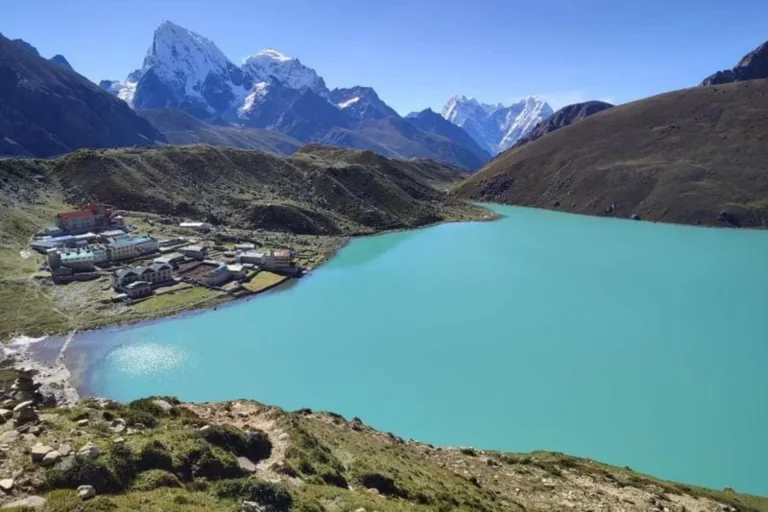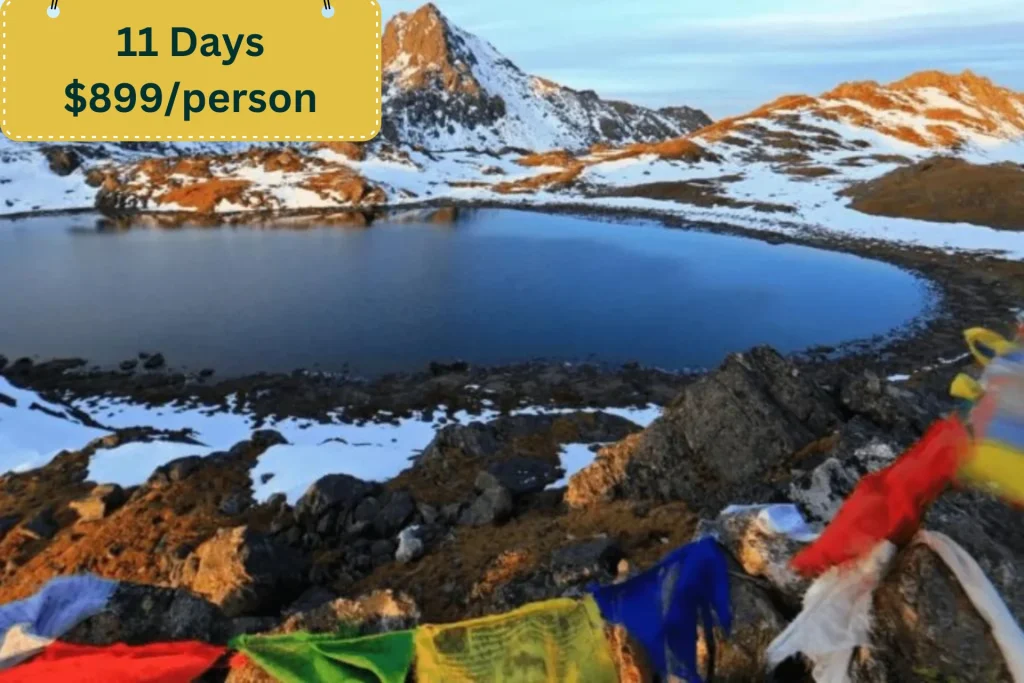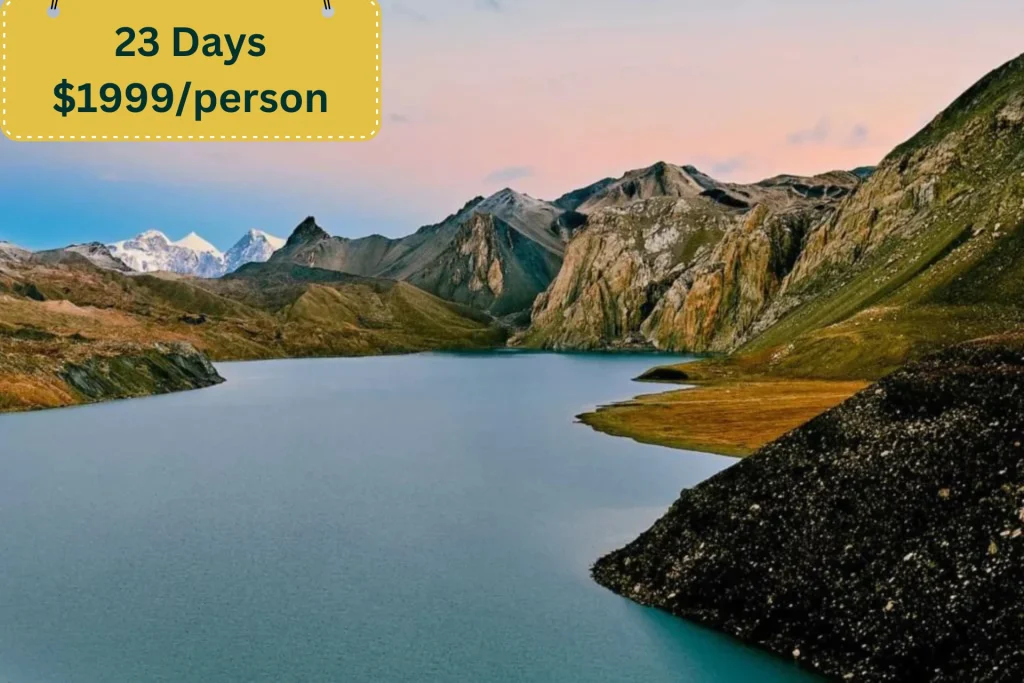Gokyo Valley Trek
Trip Overview
The Gokyo Valley Trek is a captivating adventure in Nepal’s Everest region, offering trekkers a unique perspective of the Himalayas. Starting from the bustling city of Kathmandu, the trek begins with a scenic flight to Lukla, a gateway to the Everest region. From Lukla, you will traverse through picturesque Sherpa villages, lush forests and terraced fields gradually ascending into the heart of the high Himalayas.
As you trek through the Khumbu region, you’ll pass through charming villages like Phakding and Namche Bazaar where you can experience the rich culture and traditions of the Sherpa people. Namche Bazaar, the largest town in the Khumbu serves as an important acclimatization stop and offers opportunities to explore local markets, monasteries and traditional architecture.
The trek leads you into the Gokyo Valley, renowned for its stunning high-altitude lakes. These turquoise lakes including the primary Gokyo Lake are set against a backdrop of towering peaks and glaciers, creating a breathtaking landscape. A highlight of the trek is the ascent to Gokyo Ri, a summit that provides panoramic views of the Everest massif including Mount Everest, Lhotse, Makalu and Cho Oyu. The view from Gokyo Ri is one of the most spectacular in the region offering a unique and unobstructed perspective of these legendary peaks.
Throughout the trek, you’ll also encounter the Ngozumpa Glacier, one of the largest glaciers in the Himalayas adding to the dramatic scenery. The Gokyo Valley Trek is renowned for its serene environment. The combination of stunning landscapes, rich cultural encounters and less crowded trails makes the Gokyo Valley Trek a truly memorable journey in the Everest region.
- Gokyo Lakes
- Gokyo Ri
- Everest Views
- Himalayan Glaciers
- Traditional Sherpa Villages
- Namche Bazaar
- Diverse Landscapes
- Serene Environment
Cost Includes:
- Trekking Permits
- Transportation
- Accommodation during trek *
- Guide and Porter
- Meals during trek *
- First Aid Kit
- Taxes and Fees
- Insurance for Guide And Porter
- Airport pick up and drop off
Cost Excludes:
- International Flights
- Visa fees
- Travel Insurance
- Personal Expenses
- Additional Services
- Alcoholic Beverages
- Extra Accommodation
- Cost Due To Unforeseen Events
* The cost for each trip may vary based on the selected itinerary, the duration of the trip, and any personal preferences you may have. During treks, your package includes accommodation with breakfast, lunch, and dinner. However, for your stay in major cities, accommodation is provided at a hotel where only breakfast is included, served by the hotel itself.
Permits
Obtain necessary permits including the TIMS (Trekkers’ Information Management System) card and the Sagarmatha National Park permit.
Travel Insurance
Ensure you have comprehensive travel insurance that covers trekking at high altitudes.
Accommodation
Lodges and teahouses are available along the trek but booking in advance during peak season is advisable.
Altitude Sickness
Acclimatize properly and be aware of symptoms of altitude sickness. Ascend slowly and consider extra rest days if needed.
Packing
Pack layers for varying weather conditions including warm clothing, waterproof gear and sturdy trekking boots. Don’t forget essentials like a sleeping bag, sunglasses, sunscreen and a water bottle.
Health and Safety
Carry a basic first aid kit and any personal medications. Make sure to stay hydrated and eat well to maintain energy levels.
Weather
The best time to trek is during the pre-monsoon (March to May) and post-monsoon (September to November) seasons when the weather is stable and clear.
Cash
Bring sufficient cash in Nepali Rupees as ATMs may not be available in remote areas. There are limited facilities to withdraw cash along the trail.
Respect Local Culture
Be mindful of local customs and traditions. Always ask for permission before taking photos of people and be respectful of religious sites.
Environment
Follow Leave No Trace principles to minimize your impact on the environment. Dispose of waste properly and avoid disturbing wildlife.
How difficult is the Gokyo Valley Trek?
The Gokyo Valley Trek is considered moderate to challenging. It involves trekking at high altitudes which can be demanding. Proper acclimatization and physical fitness are important to handle the altitude and terrain.
What is the best time to go on the Gokyo Valley Trek?
The best times to trek are during the pre-monsoon (March to May) and post-monsoon (September to November) seasons when the weather is more stable and the views are clear.
How long does the trek take?
The trek typically takes 12-14 days including travel to and from Kathmandu. The duration can vary depending on the pace and acclimatization needs.
What permits do I need?
You need a TIMS (Trekkers’ Information Management System) card and a Sagarmatha National Park permit.
What kind of accommodation can I expect?
Accommodation is primarily in lodges and teahouses along the trail. These provide basic amenities including a bed, meals and shared facilities. Booking in advance is advised during peak season.
What should I pack for the trek?
Pack layered clothing for varying temperatures including thermal wear, waterproof gear, a warm jacket and sturdy trekking boots. Don’t forget a sleeping bag, sunglasses, sunscreen and a water bottle.
Is there internet access on the trek?
Internet access is available in some lodges but it can be slow and unreliable.
How do I handle altitude sickness?
To prevent altitude sickness, ascend gradually and allow time for acclimatization. Stay hydrated, avoid alcohol and listen to your body. If symptoms persist, descend to a lower altitude immediately.
Can I withdraw cash on the trek?
ATMs are not available in remote areas. Bring sufficient cash in Nepali Rupees for expenses along the trail. There are limited facilities for cash withdrawal.
What should I do in case of an emergency?
Emergency evacuation may be necessary if you experience severe altitude sickness or other health issues. Ensure you have travel insurance that covers high-altitude trekking and emergency evacuation.
How do I prepare physically for the trek?
Engage in regular cardio and strength training exercises to build endurance. Hiking or trekking in similar conditions can also help prepare your body for the trek.
Trip Start & End | Kathmandu – Kathmandu | Meals | Breakfast, Lunch and Dinner |
Maximum Altitude | 5357m, Gokyo Ri | Difficulty Level | Challenging |
Transportation | Flight | Best season | Sept-Nov, Mar-May |
Accommodation | Hotels, Tea Houses | Trip Area | Sagarmatha National Park |
Day 1: Arrival in Kathmandu
→ Activities: Arrival at Tribhuvan International Airport, transfer to hotel, rest or explore Kathmandu.
→ Overnight: Hotel in Kathmandu.
Day 2: Fly to Lukla and Trek to Phakding
→ Activities: Fly from Kathmandu to Lukla (2,860m). Trek to Phakding (2,610m).
→ Overnight: Lodge in Phakding.
Day 3: Trek from Phakding to Namche Bazaar
→ Activities: Trek to Namche Bazaar the gateway to the Everest region.
→ Duration: 6-7 hours.
→ Overnight: Lodge in Namche Bazaar.
Day 4: Acclimatization Day in Namche Bazaar
→ Activities: Acclimatization hike to Everest View Hotel or Khumjung Village.
→ Overnight: Lodge in Namche Bazaar.
Day 5: Trek from Namche Bazaar to Dole
→ Activities: Trek through lush forests and Sherpa villages to Dole.
→ Duration: 5-6 hours.
→ Overnight: Lodge in Dole.
Day 6: Trek from Dole to Machhermo
→ Activities: Continue trekking through the valley to Machhermo.
→ Duration: 4-5 hours.
→ Overnight: Lodge in Machhermo.
Day 7: Trek from Machhermo to Gokyo
→ Activities: Trek to Gokyo, passing beautiful lakes along the way.
→ Duration: 4-5 hours.
→ Overnight: Lodge in Gokyo.
Day 8: Explore Gokyo Lakes and Climb Gokyo Ri
→ Activities: Hike to the Gokyo Ri for panoramic views of Everest and surrounding peaks. Visit the Gokyo Lakes.
→ Overnight: Lodge in Gokyo.
Day 9: Trek from Gokyo to Dole
→ Activities: Return trek to Dole
→ Duration: 5-6 hours.
→ Overnight: Lodge in Dole.
Day 10: Trek from Dole to Namche Bazaar
→ Activities: Trek back to Namche Bazaar
→ Duration: 6-7 hours.
→ Overnight: Lodge in Namche Bazaar.
Day 11: Trek from Namche Bazaar to Lukla
→ Activities: Trek back to Lukla
→ Duration: 6-7 hours.
→ Overnight: Lodge in Lukla.
Day 12: Fly from Lukla to Kathmandu
→ Activities: Fly back to Kathmandu. Free day for relaxation, shopping, or sightseeing.
→ Overnight: Hotel in Kathmandu.
Day 13: Departure
→ Transfer to Tribhuvan International Airport for departure or extend your stay in Kathmandu.



